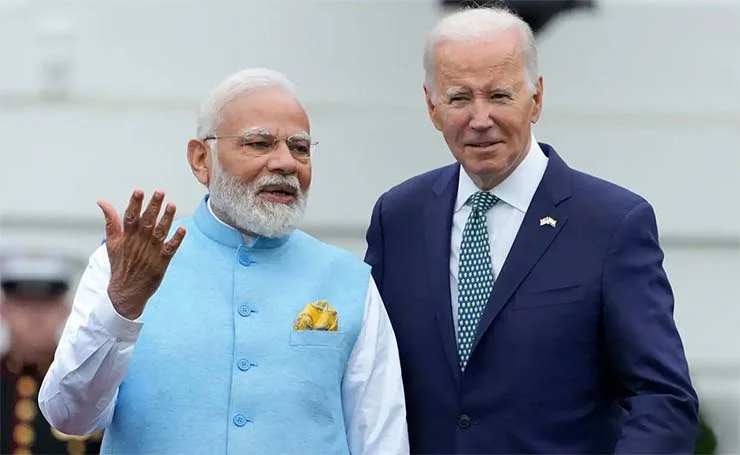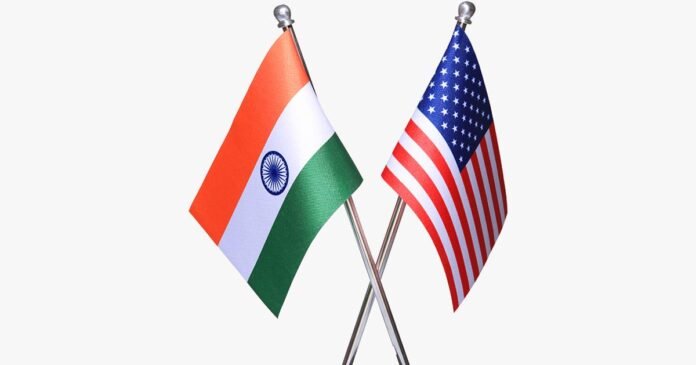The report US-India Economic Ties: To the Next Level and Beyond, released on October 8, 2024, prepared jointly by Washington-based Hudson Institute and New Delhi-based Takshashila Institute says that over the last 20 years, the US-India relationship has grown significantly, leaving behind the strains of the Cold War era when the two countries often disagreed on issues of geopolitics and economics. Economic relations between the two countries have deepened since the 1990s, but persistent trade disagreements continue to impede efforts to further boost these ties. Though the longstanding goal of both the countries has been to achieve $500 billion in bilateral trade, yet presently it stands at over just $200 billion annually.

Strengthening trade and investment ties between India and the United States requires a multifaceted approach. India would benefit on a much broader scale by limiting PLIs and instead focusing on simplifying import and export processes and reducing import duties and tariffs to create a more open trade environment
The report touches upon four key areas to increase collaboration between India and the United States;
-
- Trade and Investment
The report says that strengthening trade and investment ties between India and the United States requires a multifaceted approach. India has recently deployed schemes known as production-linked incentives (PLIs) to attract companies to set up manufacturing facilities in priority or strategic sectors – including electronics, pharmaceuticals, textiles, and white goods. Despite measures like PLIs, India’s manufacturing growth has remained relatively stagnant.India would benefit on a much broader scale by limiting PLIs and instead focusing on simplifying import and export processes and reducing import duties and tariffs to create a more open trade environment. To further attract investment and boost exports, at a time when there is a favourable geopolitical situation, the country would benefit from a regulatory system that is more predictable, transparent, and easier to navigate.Fostering state-level relationships and focusing on co-development could further enhance collaboration. For its part, the US should work to restore the effectiveness of the World Trade Organisation (WTO) and avoid weaponising international trade. Making globalisation work more effectively is the key to promote interconnectivity and resilience.
- Trade and Investment
Both India and the US should streamline visa processes, making it easier for academics and thought leaders to collaborate. Additionally, the two nations’ leaders should foster personal connections among corporate leaders
-
- Ideas and Human Capital
To attract top global talent and high-performing companies, India would benefit by making its cities more appealing and liveable. This effort requires the active participation of states and municipalities. Strengthening partnerships between American and Indian academic institutions is also critical. Instead of focusing solely on recruiting American universities to build campuses in India, New Delhi should explore symbiotic options like reciprocal study programmes.India also needs to enhance the capacity and improve the quality of its higher education institutions. Creating a more open environment for research and collaboration requires not only easier access to funding but also a reduction of unnecessary bureaucratic hurdles. This in turn would facilitate intellectual collaboration. Both India and the US should streamline visa processes, making it easier for academics and thought leaders to collaborate. Additionally, the two nations’ leaders should foster personal connections among corporate leaders. To attract the best talent, India needs policies that welcome foreign professionals. - Technology
To leverage the potential of collaboration in the technology industry, India and the United States should resolve disagreements over tariffs, regulatory barriers, and intellectual property rights. New Delhi and Washington need to prioritise cooperation in emerging technologies, such as artificial intelligence (AI) and synthetic biology, and make efforts to update regulatory frameworks to match the evolving tech landscape.Effective partnerships across academia, the private sector, and government should also be established. India would benefit by shifting its regulatory environment to be more export-friendly and internationally competitive. Increased support for and investment in the biotech sector, including advanced purchase agreements and more robust intellectual property (IP) protection, would enhance growth and collaboration in this crucial field, the report says.
- Ideas and Human Capital
To leverage the potential of collaboration in the technology industry, India and the United States should resolve disagreements over tariffs, regulatory barriers, and intellectual property rights
-
- Methods and Mechanisms
The world’s oldest democracy and the world’s largest democracy share common values and interests. Both countries are multicultural, multiethnic, secular, pluralistic, and open societies. They also have a similar vision for the global security architecture, including a stake in pushing back against China’s military and economic expansionism.The experts felt that Washington and New Delhi also need to address differences through established channels, such as pre-existing bilateral frameworks and strategic dialogues, with an understanding that differences, while inevitable, need not derail the working relationship. Sensitive issues are best managed discretely away from media attention. Informal, non-governmental diplomacy, such as CEO dialogues, can foster better understanding. India, for its part, should give its diplomatic agencies more leeway to conduct outreach.To this end, linking geostrategic and geopolitical objectives, offering political support for energy collaboration, and integrating trade into strategic dialogues can enhance cooperation. Over the last two decades, India and the United States have strengthened their strategic partnership by focusing on defence and national security. However, trade disagreements have strained economic ties between the two nations. Resolving these disputes is essential for enhancing the bilateral partnership.
- Methods and Mechanisms

Policy Recommendations
The Takshashila-Hudson Report recommended that efforts should be made to reduce PLIs; both countries should focus more on Open Trade rather than Industrial Policy, as the participants felt that de-emphasising industrial policy that artificially supports certain industries, would allow resources to flow to competitive sectors. This would promote efficiency and innovation and help businesses compete in a fair market environment. Open trade would attract foreign investment by creating a more predictable and welcoming business climate.
Washington and New Delhi also need to address differences through established channels, such as pre-existing bilateral frameworks and strategic dialogues, with an understanding that differences, while inevitable, need not derail the working relationship
India should also cultivate transparency (digital processes) and efficiency in its permitting and clearance process; further both countries should promote information about Single Window for Exports and also experiment with Innovative Policy Measures as enhancing the predictability and transparency of regulatory systems would reduce uncertainty for foreign investors and foster a more attractive business environment; India should leverage its capacity to implement and enforce policies that benefit domestic and foreign businesses; India should focus on building heavy infrastructure – including Freight Rails and Deep-Water Ports, besides India focusing on its infrastructure to compete for global market space with China.
India should focus on constructing production-ready factories, increasing transport options to move goods and people, and building ports to facilitate exports across India, which are key to developing a resilient economy; further, State-level relationships with US companies should highlight their areas of expertise, emphasizing what they can offer to investors and how effectively they can address challenges as they arise. Focusing on specifics is crucial for India to spread its wealth and broaden its skill base; and lastly, India should focus on Co-development with international partners, as India cannot afford to become isolated in a globalised world.
Access to foreign markets and the ability to become a net exporter is imperative for the success of the Indian market. Focusing on co-development with India’s international partners would increase economic prosperity, improve access to opportunities in labour and business, and stabilise international relationships.
For India and the United States to build lasting trade ties, both nations need to recommit to enduring domestic reform and multilateral trade governance, especially under the WTO
For India and the United States to build lasting trade ties, both nations need to recommit to enduring domestic reform and multilateral trade governance, especially under the WTO. To that end, this report recommends that India reduce protectionist measures and endeavour to attract investment.
Raksha Anirveda's editorial desk team brings in the collective experience of creative professionals - a fine mix of senior copy editors, writers, proofreaders and designers. Working as a team, they continuously create, manage, and curate content to sustain the magazine's profile and reputation in line with market trends and achieve magazine's goal.





